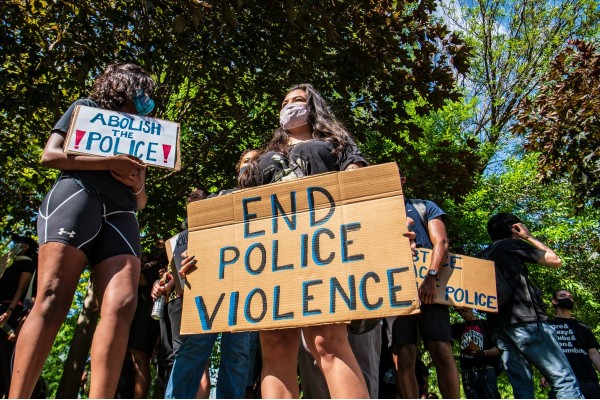Settler-colonialism targets youth
The institutionalization of children en masse is no accident; it is rooted in the logic of settler-colonialism

Young Gwich’in Girls, Midway Lake Music Festival, near Fort McPherson, Northwest Territories • Photo by Adam Jones
As the world contemplates with horror the United States’ recent policy of separating immigrant and refugee children from their parents and detaining them for attempting to cross the border, it is important to see these disturbing events in a global context and to recognize them for what they are. Although such practices also take place in Canada, the reality is that anti-immigrant sentiment is pure hypocrisy in settler-colonial states like the United States and Canada, where immigration is essential to their economic survival.
Nevertheless, both the US and Canada have long and ongoing histories of persecuting children, beginning with Indigenous children, who were kidnapped and forced to attend Residential schools or industrial schools as they were called in the U.S., where they were in essence child prisoners of war subjected to cultural genocide. The devastating effects of those policies are still visible today in the breakdown of family ties and relationships in Indigenous communities. And this is not a thing of the past, unfortunately, as we witness the alarming rate of apprehension of Indigenous children by child and family services agencies and their transfer into foster care. In Canada, the Province of Manitoba holds the dubious record for the apprehension of indigenous children. The resulting damage to family relationships leads, among other things, to the overrepresentation of Indigenous youth in the justice system.
In 2016, the Canadian Human Rights Tribunal ruled that the Canadian government discriminates against Indigenous children on reserves when it comes to providing child welfare services. A recent article in the Globe and Mail exposed a slow but steady increase in indigenous youth incarceration in Canada. One of the most tragic effects of settler-colonialism on young people is high rate of youth suicide. Indigenous youths in Canada not only have an extremely high suicide rate compared to their non-Indigenous counterparts, but they also have one of the highest suicide rates of any group in the world.
The United Nations Convention on the Rights of the Child
The United Nations Convention on the Rights of the Child is a human rights treaty that sets the standards for the political, social, economic, cultural and health rights of children. The United States is one of three countries in the world that has not signed and ratified this treaty. But every nation is subject to this binding legal instrument under international law including Canada. After ratifying the treaty, Canada made some major changes to its youth criminal laws, introducing the Youth Criminal Justice Act in 2003. Setting aside the broad parameters of this legislation with respect to the protection, promotion and respect of children’s rights, the basic intention of the Act is “to address underlying behaviour, such as pre-existing conditions or circumstances that would lead to an offending behaviour” and “to reintegrate young persons who commit offences into society through means of rehabilitation.”
Here we have ask whether the pre-existing conditions or circumstances that lead to offending behaviour by young people in Indigenous communities are not contingent on settler-colonialism itself, in which case reconciliation remains the missing bridge between reintegration and rehabilitation.
Reconciliation: think globally, act locally
We see similar disturbing violations of binding international human rights law, principles and norms that ought to protect Indigenous youth in many settler colonial contexts.. A recent report from Human Rights Watch exposed the torture of Indigenous children incarcerated in Australian prisons, for example. The kidnapping and apprehension of children has been part and parcel of the predatory nature of Israel’s settler-colonialist history in relation to the Indigenous peoples of the territory. The Yemenite Children Affair was an early instance of Israeli violation of children’s rights. Thousands of babies of new immigrants to Israel (mainly Jews from Yemen) are alleged to have been abducted by state authorities and adopted out to Ashkenazi families in the years following Israel’s founding. Of course today it is Palestinian children who bear the terrible cost of Israel’s ongoing settler-colonialist drive. They have been and continue to be subjected to systemic torture and there has been a steady increase in their incarceration in Israeli prisons, as evidenced by a report from the United Nations International Children’s Emergency Fund (UNICEF).
The oppression of children reveals settler-colonialism’s true colours. Without a change of course, without repairing the relationship with the future generation, reconciliation, whether in Canada or abroad, will be nothing more than a fairytale and will be experienced as nothing more than lies, betrayal and disappointment by a rising generation of Indigenous youth.
Winnipeg-based writer Ahmad Moussa is a human rights scholar and activist who specializes in Indigenous and Middle East issues.










